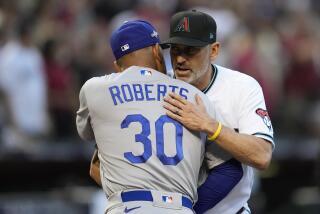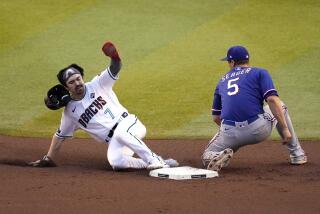Bell’s Swing Suddenly Has an Unfamiliar Ring
- Share via
PHOENIX — Jay Bell smiles, shrugs, lifts his hands in a gesture of futility and says there is no way to explain it, other than to call it an oddity.
“I’m just in one of those stretches,” he says.
An oddity? One of those stretches?
What he means is, finding his name at or near the top of the list of major league home run leaders is at odds with the conventional wisdom that suggests it would be Albert Belle, not Jay Bell.
In fact, when Bell opened the 1997 season with an array of home runs for the Kansas City Royals, local papers immediately began printing an “Albert Belle and Jay Bell Home Run Watch.”
Bell responded with a career-high 21. Belle, in a disappointing debut with the Chicago White Sox, hit 30 in between seasons of 49 and 48.
No one is suggesting another such watch, least of all Bell.
“We know what Albert is going to do,” he said. “All I’m doing is having a lot of fun so far.”
It has been a fun and surprising season for both of Ma Bell’s boys.
David Bell, primarily a utility infielder who is unrelated to Jay, has taken advantage of an opportunity to play regularly with the Seattle Mariners. He has 11 home runs, after having hit 14 in 301 previous major league games.
Jay Bell, the 6-foot, bespectacled--”I know, I look like a nerd out there but at least I can see”--second baseman of the Arizona Diamondbacks, is hitting homers at a Raul Mondesi clip. He is tied with the Dodger right fielder for the major league home run lead with 13, seven of which have either tied a game or given the Diamondbacks a lead.
Maybe, suggests teammate Matt Williams, a bona fide slugger and weight-room devotee, Bell is using a supplement.
The poor man’s creatine, says Williams--ranch dressing.
What Williams might be saying is that if these are suddenly Bell’s salad days, it’s because this straight arrow spent a large part of the winter training with the Diamondbacks’ strength and conditioning coach, Jeff Forney.
“It’s the first time in three or four years I’ve worked out hard in the winter, although my physical appearance isn’t any different than if I hadn’t lifted,” Bell said.
He’s something of a 180-pound Clark Kent who tends to think that the key to this power surge doesn’t rest in the muscle he put on but in that $119-million flexing by the Diamondbacks during the off-season.
Arizona added Randy Johnson, Todd Stottlemyre, Armando Reynoso and Greg Swindell to the pitching staff, along with Steve Finley, Luis Gonzalez, Tony Womack and Greg Colbrunn to the offense.
“Neither Jay nor Matt have to feel like they’re carrying the weight of the organization on their shoulders,” Manager Buck Showalter said. “I think that was definitely a factor last year. They’re accountable people. They take on the onus of responsibility. One of the reasons we signed them was that we knew they wouldn’t rest on the longevity of their contracts.”
Jerry Colangelo, the Diamondbacks’ managing general partner, was hammered in the industry and media for his five-year, $34-million signing of Bell, making the then-32-year-old shortstop the highest-paid middle infielder in baseball. The free-agent signing was announced on the day of the expansion draft. Colangelo subsequently traded for the then-32-year-old Williams and gave him a five-year, $45-million extension through 2003.
“I don’t need any advice on how to spend our money,” Colangelo said amid the criticism. “I know what I’m doing. But if I’m going to overpay, I’m going to do it with players of character, not with characters.”
Williams and Bell had bleak debuts with the first-year team. Williams was hampered by injuries, but Bell, the shortstop on three division-title- winning teams during seven years with the Pittsburgh Pirates, had to hit in 23 of his last 33 games to finish at .251 with 20 homers and 67 runs batted in.
“It wasn’t that we had bad years,” said Bell, a .291 hitter with the ’97 Royals. “We simply didn’t live up to the expectations as veterans with good contracts. There was a lot of focus on the money. I’m not comfortable with that but I understand it. We’re fortunate to play in an era when salaries have gone up significantly. I don’t apologize, but I am appreciative that I have the opportunity to make this much money playing the same game I played as a child.”
The expectations are now spread through a rebuilt and recharged lineup.
Williams is hitting .338 with 12 homers and 40 RBIs. Bell is at .299, with his 13 homers and 27 RBIs.
“I don’t blame last year on anything, but it’s much easier to produce now, there’s a lot less pressure,” Bell said.
“Hopefully, Matt and I will continue to do this well, but if we don’t, there’s a lineup of veterans who know how to compete for all nine innings. I think both of us have put last year behind us.”
Bell was moved from shortstop to second base late last year, lessening the defensive pressure and enabling him to concentrate on his hitting. He was moved into the second spot in the batting order this year behind Womack, the National League’s stolen-base king, and benefits from the increased number of fastballs.
Character comes in many forms.
Williams agreed to defer a large chunk of his extension, and Bell--a devout Christian married to his high school sweetheart--is deferring half of his remaining $29 million, an offer he made during the off-season to enable the Diamondbacks to control the payroll as they engineered the moves that have made the team a contender in the West.
For Bell, a manager on the field who hopes to manage from a professional dugout when this contract expires, it will be no oddity if the Diamondbacks lay a second-year embarrassment on their division rivals. The only oddity, he insists, will be if he’s involved in a home run watch in September.
More to Read
Go beyond the scoreboard
Get the latest on L.A.'s teams in the daily Sports Report newsletter.
You may occasionally receive promotional content from the Los Angeles Times.










